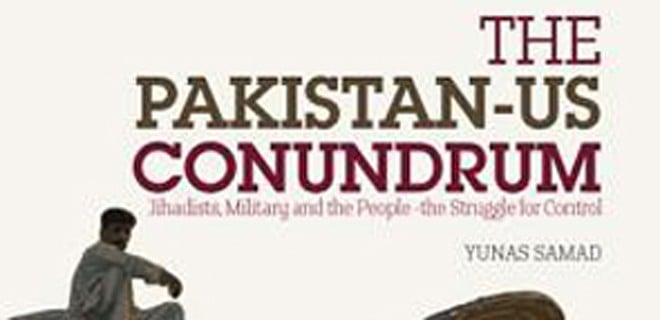

Unfolding of the post-9/11 events has changed the discourse on Pakistan -- from its role in international affairs to actors like Taliban and al-Qaeda and their interface with Pakistani polity. The tribal region of North WestFrontierProvince (renamed Khyber Pakhtunkhwa) and Afghanistan have moved from the tails end, as Chris Bayly puts it, to the centre stage of recent scholarly analysis on South Asia. Ahmad Rashid and Zahid Hussain have produced some excellent narratives on the theme.
Yunas Samad’s recent book, entitled The Pakistan-US Conundrum: Jihadists, the Military and the People: the Struggle for Control is a valuable addition to the corpus of literature on Pakistan and the challenges posed to its integrity and existence.
The book is in three parts with an exhaustive introduction that deals with the theoretical underpinnings of neoconservative ideology and centrality that Islam holds in its formulation.
Strikingly interesting is the discourse on the relocation of conflict -- from socio-economic and political to cultural -- that became ‘the primary mode of analysis’ for western policymakers and members of academia. Scholars like Bernard Lewis and subsequently Samuel Huntington pointed to a new paradigm of conflict which they saw emerging in the changing realities of the post-Cold-War world.
These scholars, along with some others of their ilk, presaged the clash between the West and Islam. The reasons foregrounded were not historical or political but cultural.
The expression ‘clash of civilization’ became a buzz-word among the western literati. It was initially coined by Bernard Lewis, but Samuel Huntington gave it a universal currency. Samad argues that this ‘paradigmatic shift’ was fructified with the rise of a neoconservative influence on policymakers, particularly after 9/11.
Thus, the binary was constituted afresh, with a new ‘Other’ -- Islam and its adherents substituting the Soviet Union.
Samad aims at dusting off the cobwebs of ambiguity and fuzziness surrounding the constructs like ‘we’ and ‘them’ by resorting to earlier historical and political context. The classification of ‘with us’ and ‘against us’ forced those who were ‘ambivalent’about such a simplistic categorisation into the opposing camp.
The first part of the book focuses on ‘War on Terror’ as a result of an ‘assault on the tower of Mammon’ on September 11 and its implications on South Asia. The ‘Operation Enduring Freedom’, al-Qaeda’s transnational character and the Taliban’s ascendancy in Afghanistan are the sub-themes of this part.
The second part is devoted to the Afghan jihad and its fallout on Pakistan, manifesting particularly in the formation of the mullah-military alliance and its political role.
The last part is a commentary on the politics of Pakistan in which the clash of the opposites has been showcased -- parliamentary democracy espoused by the liberal political parties and dyarchic arrangement prescribed by the military in collusion with the religious-right.
The author weaves together divergent themes into a tapestry-like narrative which exhibits his dexterity as an effective writer. Changing connotation of jihad in the historical perspective, the emergence of al-Qaeda in the politics of ethnicities in Pakistan and the estranged relations between India and Pakistan are a few of the diverse themes Samad touches upon in his book. He further studies the processes leading to the ascendancy of the Islamic forces into two different socio-political settings of Pakistan and Afghanistan, punctuated with waxing and waning of American interest in both the countries.
Samad is a historian who has serious engagement with sociology. Therefore, he manages to be diachronic and synchronic with alacrity while unravelling the sticky state the two countries currently find themselves in. He lends academic profundity to the text by corroborating theoretical formulations with factual details.
Samad puts the record straight by alluding to ‘collective amnesia in the West and particularly in the United States’ about their role in deploying militant Islam for the sake of their own interests. Once Soviet Union retreated, United States and its western allies opted to turn their back to the rest, leaving them to fend for themselves.
Samad situates Pakistan within the context of a discourse in media that is informed by cultural racism, and is resonating because of the antagonistic states like India and Israel. Usually in the spotlight for all the wrong reasons, be it Islamic and al-Qaeda militants, persecution of minorities or the nature of Pakistan army that is always waiting in the wings to grab the reins of power… Pakistan is situated tantalisingly close to China, India, Iran and Russia, and hence of great strategic importance to the major powers.
A country with a stained image is being doggedly fostered by particular interest groups within western media, which forgets that Pakistan did not even once falter in its support to the West during the cold war.